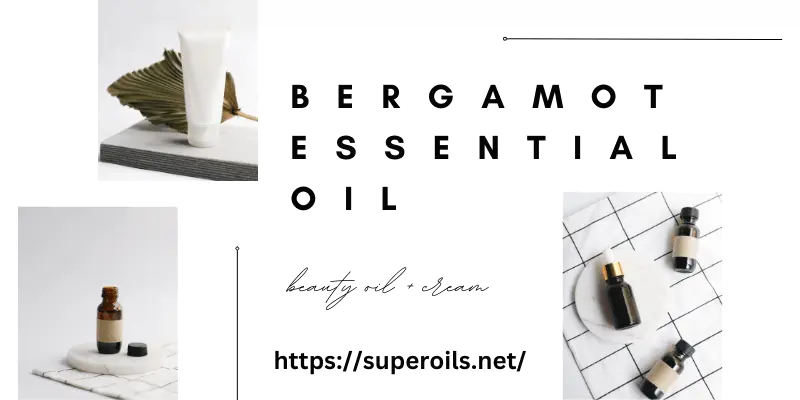How to Use Bergamot Essential Oil for Stress Relief
Published: 10 Jan 2025
Bergamot essential oil, extracted from the rind of the bergamot orange, is a powerhouse in natural wellness. Packed with linalool and limonene, it offers calming, antibacterial, and mood-enhancing properties. This versatile oil has been cherished for centuries in skincare, aromatherapy, and emotional healing.
What is Bergamot Essential Oil Made From?
Bergamot essential oil is made from the rind of the bergamot orange, a citrus fruit primarily grown in Italy and parts of the Mediterranean. The oil is extracted through a cold-pressing process, which preserves its fresh, aromatic properties and active compounds like linalool and limonene.
For a deeper understanding of different types of oils and their uses, check out our Types of Oils guide.

The Science Behind Bergamot
The science behind bergamot lies in its rich chemical composition, including linalool, limonene, and bergapten. These compounds give it its unique properties, such as calming effects, antibacterial benefits, and mood enhancement. Research shows that bergamot essential oil interacts with the nervous system, promoting relaxation and reducing stress.
Top Benefits of Bergamot Essential Oil
Bergamot essential oil offers a wide range of benefits, making it a favorite in natural wellness. However, like any product, it has a few drawbacks to consider. Here’s a quick look at its advantages and disadvantages:
Advantages
- Improves mood and reduces stress.
- Soothes acne and promotes clear skin.
- Relieves inflammation and pain.
- Enhances hair and scalp health.
- Provides antibacterial and antifungal properties.
How to Use Bergamot Essential Oil Safely
Bergamot essential oil is highly versatile but must be used carefully to ensure safety. The key to safe usage lies in proper dilution. Always mix the oil with a carrier oil like coconut, jojoba, or almond oil before applying it to the skin to prevent irritation. A general rule is to use 2-3 drops of bergamot essential oil per tablespoon of carrier oil. Since bergamot is photosensitive, avoid applying it to areas exposed to direct sunlight for at least 12 hours.
For aromatherapy, add 3-5 drops of bergamot essential oil to a diffuser filled with water. When using it in baths, mix the oil with a dispersing agent like Epsom salts to prevent it from sitting directly on the skin. Conduct a patch test before first use, especially if you have sensitive skin. Follow these steps to enjoy bergamot essential oil safely while maximizing its benefits.
Tips for Choosing the Best Bergamot Essential Oil
Choosing the best bergamot essential oil involves checking for factors like purity, source, and extraction method. Look for oils labeled as 100% pure and therapeutic grade. Ensure it’s sourced from reliable regions like Italy, where bergamot thrives, and opt for oils extracted through cold-pressing to retain maximum potency.
Conclusion
So guys, in this article, we’ve covered Bergamot Essential Oil in detail. From its benefits to how to use it safely, this oil is a wonderful addition to your wellness routine. I personally recommend giving it a try, especially if you’re looking for natural stress relief or glowing skin.
Don’t forget to check out high-quality bergamot oils from trusted sources. Start incorporating it into your daily routine today!.For more insights on essential oils, visit our Essential Oils Guide and explore the Types of Oils available to enhance your wellness journey.
FAQs
Is Bergamot Essential Oil Safe to Use Every Day?
Yes, bergamot essential oil is generally safe for daily use when properly diluted. It can be used in skincare routines or diffused for relaxation. Just remember to avoid direct sunlight for 12 hours after applying it to your skin.
Can Bergamot Essential Oil Be Ingested?
Bergamot oil should not be ingested unless under the guidance of a healthcare professional. While it has some medicinal properties, consuming essential oils can be harmful. Always consult a doctor before considering internal use.
What Makes Bergamot Essential Oil Different from Other Citrus Oils?
Bergamot essential oil has a unique combination of citrus and floral notes, which sets it apart from oils like lemon or orange. It’s also known for its calming effects on the mind, unlike the more energizing qualities of other citrus oils. This makes it ideal for stress relief.
Is Bergamot Essential Oil Safe for Sensitive Skin?
Bergamot oil can be used on sensitive skin, but it must be diluted properly. Always perform a patch test before applying it widely. If you have sensitive skin, consider using it in small amounts and avoid sun exposure after use.
Can Bergamot Essential Oil Help with Anxiety?
Yes, bergamot oil is known for its ability to reduce stress and anxiety. It has calming properties that help soothe the nervous system. Diffusing it or applying it in a diluted form can have a positive effect on emotional well-being.
How Long Does the Scent of Bergamot Essential Oil Last?
The scent of bergamot oil can last for a few hours when diffused. For longer-lasting effects, apply it to your skin or use it in your bath. The duration may vary based on the environment and method of use.
